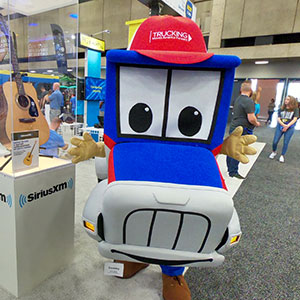The Trucker: TCA, ATA leaders discuss issue facing trucking industry
By Cliff Abbott
GRAPEVINE, Texas — The Truckload Carriers Association and the American Trucking Associations haven’t always seen eye to eye, but the current leaders of both organizations understand that they can accomplish more for trucking with cooperation than with conflict.
That was one of the topics discussed at a Wednesday morning forum held at the TCA annual convention here. Moderated by TCA President Chris Burruss, the panel included ATA Chairman of the Board Philip Byrd, ATA President and Chief Executive Officer Bill Graves and incoming TCA Chairman Shepard Dunn.
Burruss began with a question about highway funding.
“We like the highway fuel tax system,” Byrd said, sounding a familiar theme, “but it has fallen way behind the times. “
He described a current ATA/TCA joint committee created to study various methods of paying for needed repairs to the country’s highway infrastructure, concluding, “We can’t do our jobs for America without a safe and efficient highway system to do it on.”
Burruss then turned to Bill Graves, asking “If the federal government doesn’t act, what can we do to prevent the responsibility for highways from falling to the individual states?”
Graves responded, “It would be a mistake to devolve the highway system to the states,” adding, “at the end of the day, we need a federal solution.”
Graves warned of a $19 billion shortfall in the Highway Trust Fund that will need to be made up by August or September of this year. Since 2014 is an election year, he doesn’t expect much enthusiasm for raising additional revenues from members of Congress. “This will be a can that they kick down the road,” he said.
The driver shortage was the next topic of discussion.
Burruss noted, “We find ourselves in a position where nobody wants to drive a truck anymore,” asking panel members for their suggested solutions.
Dunn went first, stating, “We need to make sure we have an environment that’s good for drivers. Are they happy? Is the pay right?”
Burruss interjected, “We all would agree that wages need to be higher.” Byrd added, “We need to look at how we compensate and incentivize our drivers. Each company,” he continued, “needs to ask, what does it cost to recruit a new driver and put that money into driver wages.”
Byrd then broached another issue that is important to many drivers.
“The truck drivers that move America’s freight aren’t respected,” he said. “It is paramount that we, as an industry, change that.” Regarding driver wages, Byrd said there is no “silver bullet,” concluding with the question, “at some point, do we have to look in the mirror?”
Graves revisited the infrastructure issue, saying, “I’m truly optimistic that Congress will get around to addressing the infrastructure issue.
The subject turned to natural gas. Dunn offered, “We have a dual-fuel system that does really well in some areas and not so well in other areas,” he said. He pointed out that fueling infrastructure is still a problem, noting that short runs that return to the same terminal nightly are the best candidates for use of natural gas. As to whether the industry will accept the fuel, he said, “A lot of carriers are kind of ‘kicking the tires’ and I don’t see a lot of implementation.”
Graves was more optimistic. “It’s exciting that for the first time in the history of trucking we have a fuel that competes with diesel,” he said.
Finally, the panel took on the political scene in Washington and an overabundance of regulatory action. Graves noted that real progress wasn’t likely until after the 2016 presidential election, stating, “We need someone who’s a little more business friendly and not so eager to participate in regulatory overreach.”
Byrd zeroed in on CSA. “They have a line,” he said, “and if a carrier’s score goes over that line, the government gets involved with an intervention. Wouldn’t it be great,” he asked, “if there was a line that said we will incentivize carriers to achieve a gold standard of safety?”


